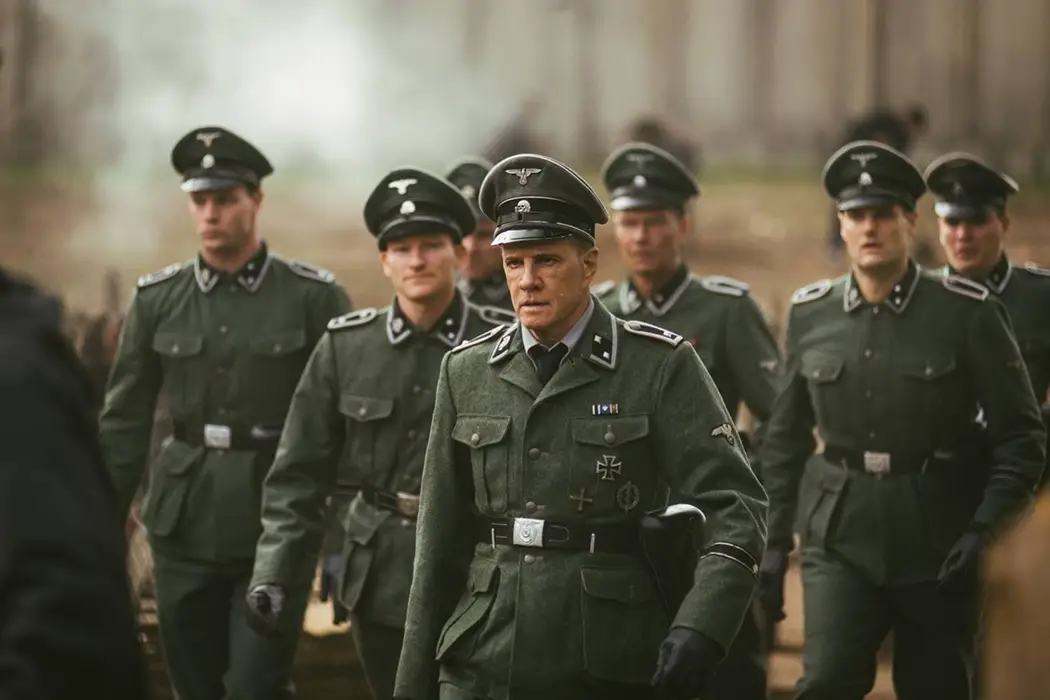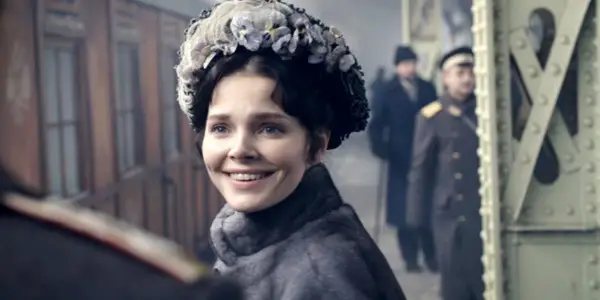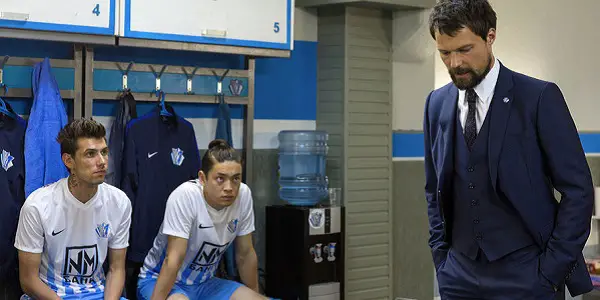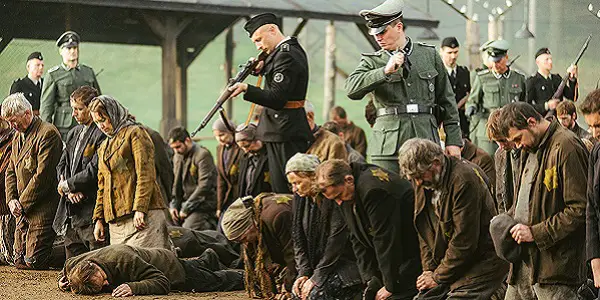A Preview Of Russian Film Week In New York

Lee Jutton has directed short films starring a killer toaster,…
Russian Film Week in New York 2018, presented by Russia’s Rock Studio Films and the Cherry Orchard Festival, kicks off Saturday, December 8 at the SVA Theater and runs through December 14. During that time, 15 Russian films ranging from historical epics to intimate dramas, quirky comedies to insightful documentaries, will be screened. I was able to preview four of the films on offer, including Russia’s submission for this year’s Best Foreign-Language Film Academy Award. As someone who has unfortunately not watched many Russian films not directed by Eisenstein or Tarkovsky (so, you know, hardly anything contemporary), I was excited to see what the modern Russian filmmaking world has to offer. Read on to find out for yourself.
Anna Karenina: Vronsky’s Story (Karen Shakhnazarov)

Leo Tolstoy’s classic tale of tragic passion gets taken for another go-round on the screen thanks to director Karen Shakhnazarov. His take on the tale, however, has a twist: the story is told as flashbacks by Count Vronsky thirty years in the future, to Anna Karenina’s now-adult son, Sergei (Kirill Grebenshchikov). With a script drawing from both Tolstoy’s novel and Vikenty Veresaev’s writings about the Russo-Japanese War, Anna Karenina: Vronsky’s Story introduces Sergei, a world-weary military doctor, to Vronsky (Max Matveev), a colonel, in a remote Manchurian village. There, Sergei demands that Vronsky tell him the story of the mother he barely knew.
Alas, the film, while impeccably designed, lacked the romantic magic of Tolstoy’s novel. The scenes that take place during the Russo-Japanese War do not add anything valuable to the story apart from giving Vronsky, typically a very unsympathetic character, a chance to tell his side of the story – and even then, he doesn’t tell audiences anything that, if familiar with Tolstoy’s tale, they don’t already know. A subplot involving his friendship with a mysterious singing Chinese girl, seemingly inserted to give Vronsky another chance to redeem himself, feels pointless and falls flat.
Apart from the gloriously decadent period costuming by Dmitriy Andreev and Vladimir Nikiforov, the best part of the film is Elizaveta Boyarskaya’s performance as Anna, a woman with angelic beauty that masks the fire and fury within her heart. Anna desires passionate love, above all things; when her cold and unloving husband, Alexei, refuses to divorce her due to her affair with Vronsky out of “respect”, she is even more furious than if he had beaten her over her confession. In Anna’s eyes, if her husband had attacked her, at least he would have shown himself capable of such intense emotions as love and anger. When her relationship with Vronsky begins to settle down from its early, exciting phases into a domestic monotony that bears an uncomfortable resemblance to her earlier marriage, Anna once again grows restless and bitter. Her mood swings, while unpleasant, are easy to empathize with – much more so than the actions of Vronsky.
Anna Karenina is a woman with a very modern attitude towards love, trapped in a time period that expects her to quietly continue a “respectable” life with a man she loathes with no thought for her own happiness. By the time Anna Karenina: Vronsky’s Story reaches its climax – not with Anna’s suicide, mind you, but with a big battle scene in Manchuria – you’re left wondering why one would even bother telling Vronsky’s side of the story when Anna’s remains so much more intriguing.
The Coach (Danila Kozlovsky)

Danila Kozlovsky, a well-known actor in Russian film, makes his directorial debut in The Coach, a soccer drama that, while riddled with cliches, is still incredibly enjoyable. The film was released in Russian cinemas in spring of 2018 to coincide with that country’s hosting of the World Cup. In addition to directing, Kozlovsky also stars as Yuri Stoleshnikov, a star soccer player who is humiliated on the international stage when he misses a decisive penalty while playing for the Russian national team, loses his head and causes a big scene. Unable to contemplate returning to the sport after this disaster, Yuri moves to a small town and accepts a job as head coach of the local club Meteor FC.
A second division team with barely any budget and scant hopes of being promoted to the top flight of Russian soccer, the most Meteor can truly hope for is a successful run in the Russian cup competition. At first, Yuri alienates more of his players by insulting their physical condition (subpar) and training them too aggressively. But, with the help of ambitious team president Lara (Irina Gorbachova) and physiotherapist (Olya Zueva), among others, Yuri gradually gets Meteor on the road to success and re-discovers his love of the beautiful game.
If you name a sports drama trope, The Coach has it. A love story that starts out on the wrong foot? Check. A family tragedy? Check. An offer to leave the underdogs for a better job that forces our hero to do some soul-searching? A big fat check. Yet even as the film bounced from one predictable plot point to another, I couldn’t help but be drawn into the story. This is likely partially because I am a huge soccer fan and a sucker for any fictional story involving the sport, but credit is also due to Kozlovsky for doing a remarkable double-duty on his directorial debut. His energetic performance in the titular role ensures that you stay invested in Yuri’s struggles even as the film tips over the two-hour mark.
The various supporting actors also deserve recognition for taking characters that, on paper, are little more than cliches and elevating them into three-dimensional humans one can’t help but care about. The final soccer match is as exciting and packed with drama as one could possibly hope for. In the end, I found myself not caring that The Coach felt like every other sports story ever told onscreen because I only cared about Yuri and Meteor FC.
Elephants Can Play Football (Mikhail Segal)

Contrary to what you might think, based on its title, Elephants Can Play Football is not another soccer movie. But, in an accurate reflection of its title, it was by far the weirdest film of the four I watched. The uncomfortably funny and incredibly odd drama from director Mikhail Segal tells the story of Dima (Vladimir Mishukov), a forty-something man working in environmental business whose life revolves around corporate meetings where nothing ever gets done, evening soccer matches with his friends (okay, there is some soccer in it), consuming endless amounts of tea, and “doing the plank.” He’s successful and physically fit, but his life seems rather empty and lonely; his only interactions outside of business seem to be Skype calls with his parents, who can never manage to avoid having their heads get cut off onscreen.
However, Dima’s life begins to take some increasingly bizarre turns after, on one business trip, he meets Masha (Sofia Gershevich), the teenage daughter of an old university friend. After an afternoon of bonding over tea and exploration, Masha bursts into Dima’s hotel room in the middle of the night. She refuses to tell Dima what has happened or to let him call her parents – rather, she just asks to be able to spend the night in his room. And she does simply that – no funny business.
Upon his return home, Dima attempts to cultivate similar relationships with women young enough to be his daughters, first with Sveta (Varvara Pahomova), another daughter of friends, and then with Lika (Alexandra Bustryzhickaya), a young woman who comes into Dima’s life abruptly and with whom he becomes incredibly close. Dima introduces Lika to coworkers and friends as his daughter, fusses over her when she’s sick, buys her clothes and gifts, and takes her on trips. He doesn’t dare anything close to a romantic overture. Yet is trying to be the surrogate father to a girl of twenty just as creepy as trying to date her?
Reminiscent of films by Charlie Kaufman and Todd Solondz when at the height of their powers, Elephants Can Play Football is often uncomfortable to watch, but it’s also impossible to tear your eyes away from Dima and his oddball activities. As played by Mishukov, it’s easy to have sympathy for such a sad, lonely man, even if you disapprove of his weird relationships with these women. It helps that healthy doses of absurd humor, such as when Dima lectures a colleague late to a meeting by going on a rambling existential monologue about lateness that delays the meeting even further, keep Elephants Can Play Football from venturing too far into the dark.
Sobibor (Konstantin Khabenskiy)

With Sobibor, a dramatic retelling of the uprising in the titular concentration camp in 1943, another prominent Russian actor makes his feature directorial debut. This time it is Konstantin Khabenskiy, best known to international audiences for his roles in the insane vampire opuses Night Watch and Day Watch. Russia’s official submission for this year’s Academy Award for Best Foreign-Language Film, Sobibor also stars Khabenskiy as Soviet-Jewish Red Army soldier Alexander Pechersky, who led the uprising – the only one to be successful during the entirety of World War II. Yet one imagines that it was the subject matter, rather than the quality of the film, that deemed Russian officials to select this as their annual Oscar bait, for Sobibor is a decidedly subpar movie.
Sobibor depicts Nazi brutality in disturbingly graphic fashion, and these scenes constitute much of the film. It is important that modern audiences be reminded of the horrors of the Holocaust, so that we may never repeat them, but there was something about the way these atrocities were depicted in Sobibor that struck me as tasteless. From showing a room full of naked women slowly die in the gas chambers, to depicting a Nazi party that involves the setting on fire of a Jewish man desperate to see his wife again (she died in the aforementioned gas chamber scene, in case you were wondering), Sobibor almost seems to take sick delight in showing us how evil the Nazis were, as though we need to see these things to justify the uprising that is to occur later in the film. Yet it is the more subtly horrifying moments, such as a man sorting through the jewelry taken from the dead and finding the wedding ring he made for his wife, that have the greater impact.
What is most disappointing about Sobibor is that the film spends more time depicting violence and torture than it does developing any of the characters, including Pechersky. It’s as though the writers determined that audiences would be so focused on seeing Nazis get killed that there would be no need to flesh out the personalities of anyone partaking in the uprising. I wanted to know more about the stories behind these heroic figures, and about what drove them to fight back against their captors when so many other concentration camp prisoners did not.
The beginnings of the uprising, in which the prisoners lure Nazi officers to their deaths one by one with the promise of offering them the best of the goods confiscated from the Jews, is a deliciously tense bit of filmmaking and shows what Sobibor could have been if the rest of the film had been handled with such a deft touch. Yet as soon as the uprising truly begins, the film devolves into a heavy-handed mess of slow-motion and absurd sound-effects, and one is left disappointed once again.
Russian Film Week
These four films are, of course, only a fraction of what there is to see at Russian Film Week, but based on this admittedly small sample size, I’d recommend you stay away from the historical epics and instead experiment with the other, less flashy films that the festival has to offer.
What do you think? Does Russian Film Week in New York sound like an interesting event? Share your thoughts in the comments below.
You can find more information about Russian Film Week in New York here.
Does content like this matter to you?
Become a Member and support film journalism. Unlock access to all of Film Inquiry`s great articles. Join a community of like-minded readers who are passionate about cinema - get access to our private members Network, give back to independent filmmakers, and more.
Lee Jutton has directed short films starring a killer toaster, a killer Christmas tree, and a not-killer leopard. Her writing has appeared in publications such as Film School Rejects, Bitch: A Feminist Response to Pop Culture, Bitch Flicks, TV Fanatic, and Just Press Play. When not watching, making, or writing about films, she can usually be found on Twitter obsessing over soccer, BTS, and her cat.













